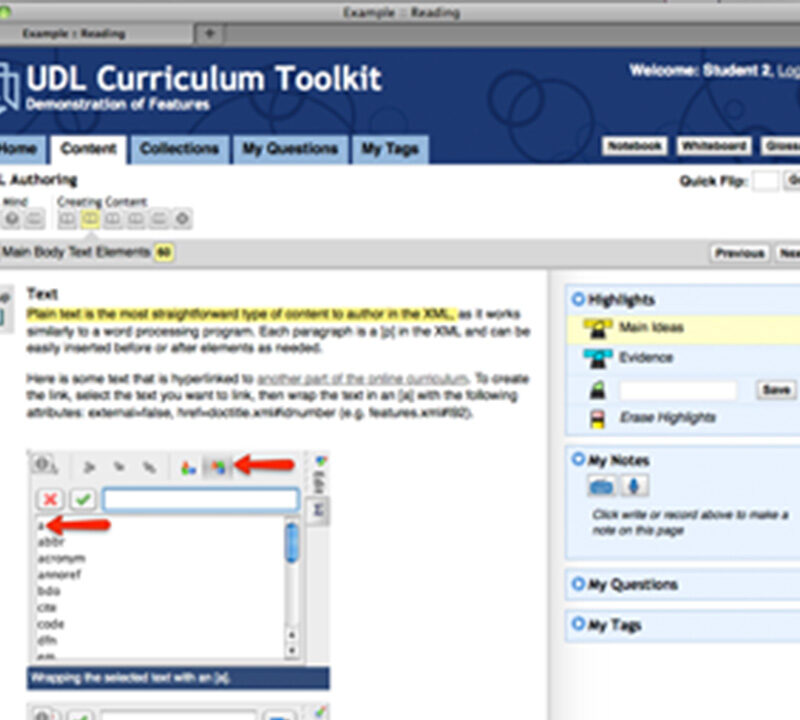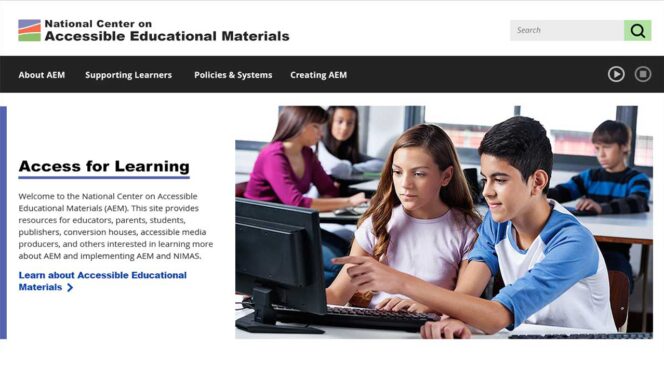Providing deep learning experiences for all students is a primary challenge of classrooms everywhere. Barriers to learning occur in students’ interaction with the curriculum because of increased content complexity and process-level demands, the diversity of students’ learning needs, the demands of differentiation, and economic constraints for materials development and teacher professional development.
Many CAST projects have built custom technology-based tools to address specific curricular challenges. This time we took on the broader challenge of building a general-purpose toolkit that could be used to quickly and easily build online experiences with built-in UDL supports for any curricular content.
The UDL Curriculum Toolkit, as it came to be known, was originated in a collaboration between CAST, the University of Michigan, and the Education Development Center (EDC), funded by grants from the National Science Foundation (2007-2011; NSF DRL-0730260, 0730348, and 0730603). The University of Michigan and EDC each were in the process of developing inquiry science programs: IQWST and Foundation Science, and both were interested in exploring how their material could better support a diversity of learners. The National Science Foundation encouraged our three organizations to work together to build the online framework and guidelines for how others could infuse UDL into inquiry science teaching and online exemplar units from IQWST and Foundation Science.
The UDL Curriculum Toolkit was the first system of its kind, an open-source web application designed to support the creation of interactive, multimedia curricula according to the principles of Universal Design for Learning (UDL). It includes a Java server framework that manages accounts and data tracking, a system to translate curriculum materials in the standard NIMAS format into web pages, extensive configuration options, and a highly customizable design so that each Toolkit-based site could look unique.
Within this framework, the Toolkit was stocked with features that facilitated comprehension (e.g., highlighting, accessible text, vocabulary support), encouraged action and expression (e.g., notetaking, prompts for writing, drawing, and audio recording), and recruited and sustained engagement (e.g., video, teacher feedback, collaborative whiteboard). Teachers used the application to track students’ progress, see and compare responses, student highlighting and notes, and provide individual or group feedback. For research purposes, the application included detailed logging of students’ actions and the ability to turn on or off program features.
After this initial project, the UDL Curriculum Toolkit was used in many later projects to build online materials. For example, a version was used to create the interactive online edition of Universal Design for Learning: Theory and Practice, which is still in use today.
For more information about the UDL Curriculum Toolkit, contact Boris Goldowsky.
UDL Curriculum Toolkit Applications
2007 – 2011
IQWST: UDL
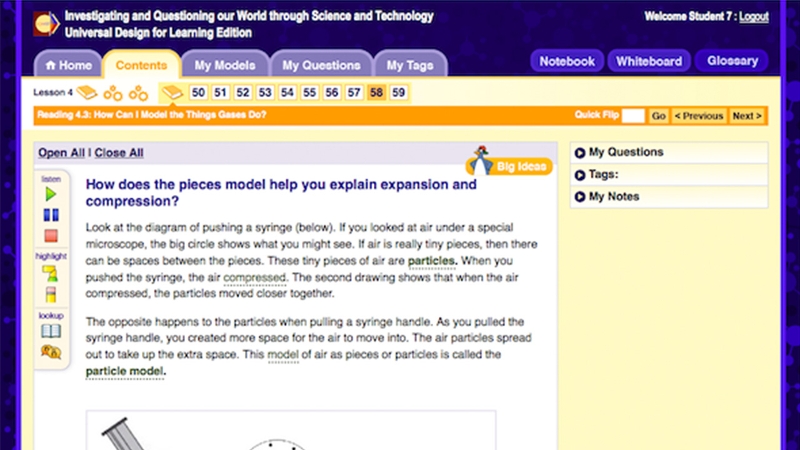
IQWST-UDL was one of the original UDL Curriculum Toolkit exemplars and tested the potential of the Toolkit’s use in enhancing student experience and outcomes in inquiry science education for middle-school students. IQWST is a 12-unit, full middle school science curriculum that focuses on big ideas, on scientific practices as integral to the scientific enterprise, and on integrating literacy practices and science content learning.
2007 – 2011
Foundation Science: UDL
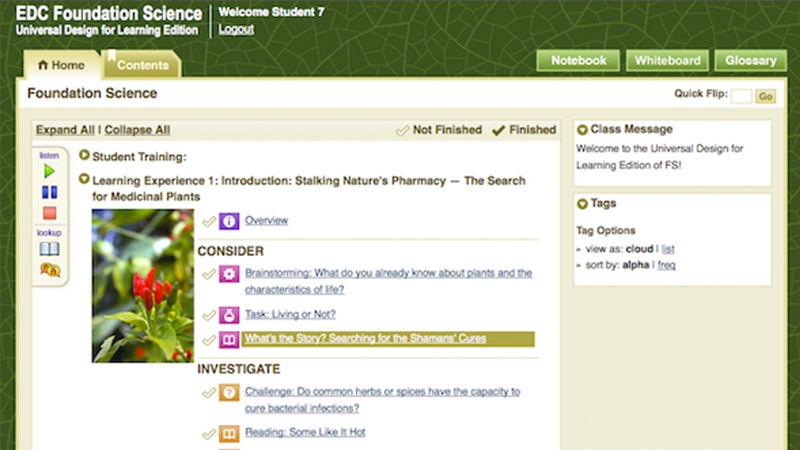
The Foundation Science exemplar explored the Toolkit’s use in enhancing high school students’ learning in inquiry science classes. The exemplar chapter, Simple Change, Unintended Consequences: Exploring Ecosystems, is drawn from EDC’s Foundation Science project, which developed four full years of standards-based curriculum stressing science practices in tackling scientific challenges.
2009 – 2014
DynaBook
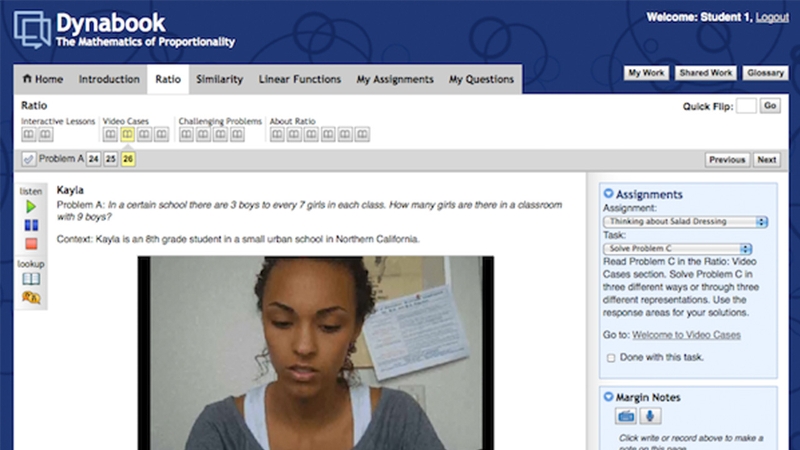
In this project, SRI International collaborated with CAST to create a digital media resource (a “DynaBook”) based on the Toolkit, coupled with a novel preservice education model to support the development of teachers Technological Pedagogical Content Knowledge or TPCK. Through the use of the DynaBook, preservice teachers deepened their own content knowledge, developed key pedagogical skills, and were supported in the beneficial use of technology in teaching. The goal was to advance the preparation of preservice teachers in middle school mathematics, specifically on the topic of proportionality.
2010 – 2012
Biocomplexity
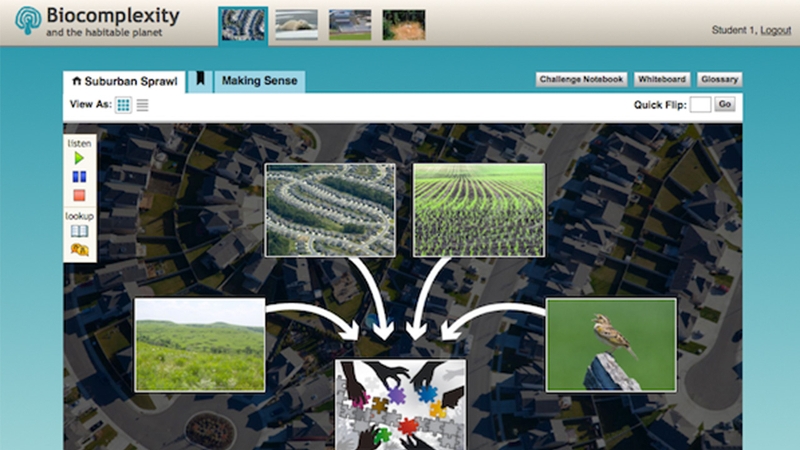
TERC, in collaboration with CAST, used the transformation of an existing biocomplexity curriculum as the context for advancing the field of curriculum design with UDL principles. It also advanced the functionality of the UDL Curriculum Toolkit to include scaffolds, supports, and interactivity for images, graphs, diagrams, and models.
2011 – 2013
Foundation Science: Physics
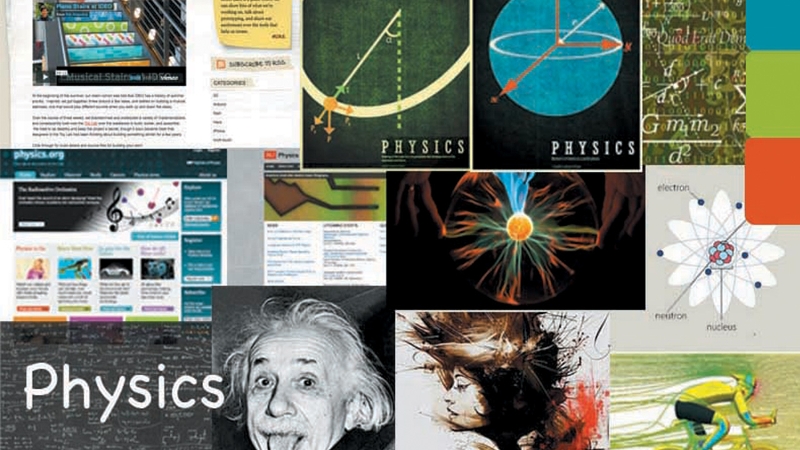
To improve science literacy outcomes for at-risk diverse learners and broaden participation in science learning, CAST, in collaboration with EDC, created a proof-of-concept, next-generation learning module in physics. The learning module combined UDL learning design, high-quality physics content tied to the Common Core State Standards, targeted support and scaffolding for students, and learning analytics with feedback mechanisms providing for apprenticeship in the learning environment with frequent opportunities for practice with feedback. At the conclusion of the project, the module was published as an Open Education Resource and remained available until 2021.
2013 – 2015
Inquiry Primed
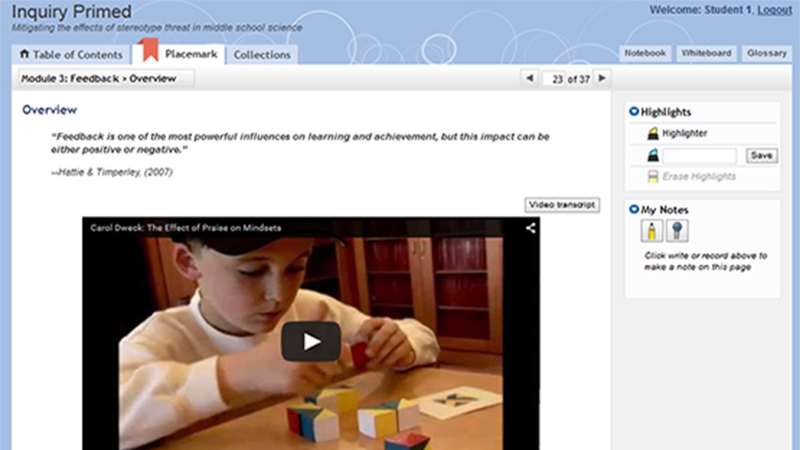
Inquiry Primed was created to pilot a professional learning experience that supported teachers in reducing the impact of stereotype threat in middle school science. The four 2-week Inquiry Primed professional learning modules took advantage of features in the UDL Curriculum Toolkit to increase participant understanding, facilitate strategy use, and build a community of practice. Participants read, viewed videos, and linked to resources to build understanding. They used the Highlighting and My Notes features to collect notes, thoughts, and ideas, and they may share ideas with their small group using the Whiteboard feature. Participants transferred research to practice by getting facilitator and peer support while using strategies in their classrooms and participating in small group community of practice discussions with peers.
Learn more about Inquiry Primed
